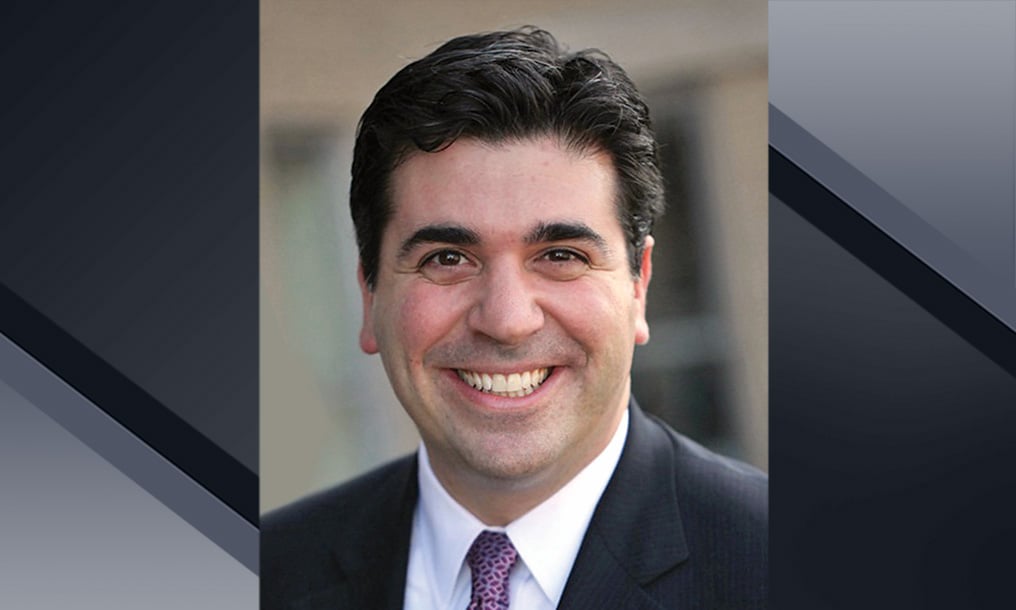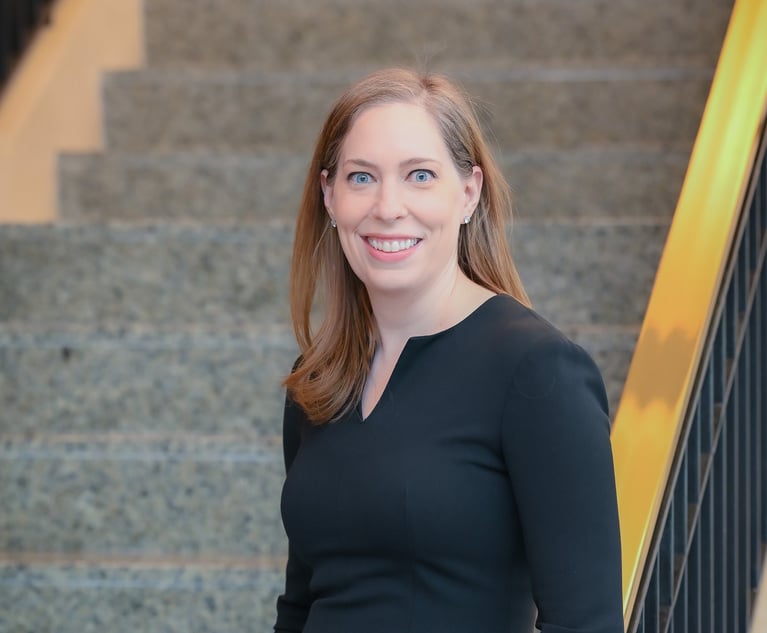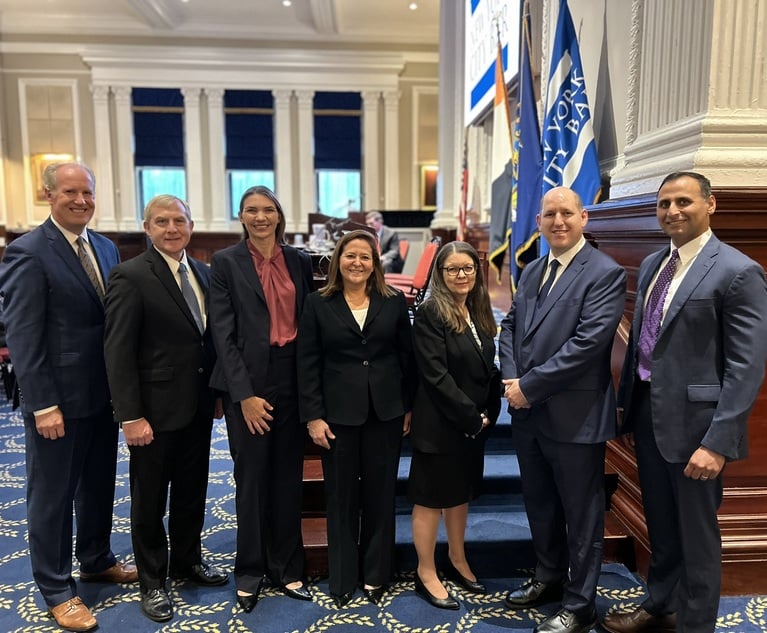Distinguished Leader: Glen McGorty
NY Office Managing Partner, Crowell & Moring
October 17, 2019 at 11:11 AM
4 minute read
 Glen McGorty, NY Office Managing Partner, Crowell & Moring
Glen McGorty, NY Office Managing Partner, Crowell & Moring
What are some of your proudest recent achievements? One is the progress we've made in increasing the diversity of our New York partnership. Crowell has always had an abundance of talented and diverse attorneys at the junior ranks, but not so much at the partner level. This is a common pattern in big law for sure, but it wasn't something I was willing to accept. A team of associates, counsel, recruiting professionals, and firm leaders passionate about this issue worked with me to change the composition of the office at the partner level—and it is starting to pay off. It was gratifying to see our early progress gain momentum as new diverse partners contributed to the campaign with initiatives of their own, and I'm proud to say that through recruitment and internal promotion, nearly half of our New York partners, and half of all our New York lawyers, are diverse by gender or otherwise. I was also proud of the experience we had recruiting an entire health care team from an elite New York law firm last year. What began as a conversation with one lawyer quickly advanced to the entire nine-lawyer team choosing to come to Crowell, and transitioning seamlessly into our office. The commonality in these experiences is that they both affirm our culture, which really distinguishes us from competing firms with equally compelling capabilities.
What does it mean to be a leader? Leadership is service to others. In the law firm context, this means being willing to set aside your personal interests to support the people around you and advance the needs and interests of the whole organization. Law firm leaders are drawn in many competing directions, and the best ones can see how to balance individual, office, and firm needs for the best total outcome.
Name a lawyer or mentor whose leadership inspired you. I've been lucky to be inspired by many, but to pick one … before entering the national stage, Jim Comey was the U.S. Attorney for the Southern District of New York. I had the privilege of being his first AUSA hire, and served under him for a year before he left to be the Deputy Attorney General. Jim was always present and knew something about what every AUSA was doing. Brimming with wisdom and integrity, he could step out in front and lead, but he never made you feel that he wasn't a part of the team.
How are the business and profession of law changing, and how should lawyers adapt for the future? In the past, clients had problems and lawyers solved them, but it was transactional: rates were rates and there was little window into the non-legal challenges clients faced. To be competitive and successful today, firms must truly partner with clients in driving results, sharing risk, offering alternative fee arrangements, listening to their call to arms on diversity and inclusion, and creating teams that reflect those same principles. We need to find out what matters most to the client and align with it to cultivate and preserve a relationship, even at the expense of the billable hour.
What is the best advice for someone considering a career in law, or someone already in the profession who is seeking to make a greater impact? Find something you love. If you're passionate about how you spend your time, the time you spend will be rewarding. In the context of a law firm, don't just complete tasks … ask questions. Curiosity separates the good junior lawyers from the great ones. Seek to understand the strategy—how does the task you've been asked to complete fit into the bigger picture? If you find something that interests you, jump in with both feet and you can transform a job into a calling.
This content has been archived. It is available through our partners, LexisNexis® and Bloomberg Law.
To view this content, please continue to their sites.
Not a Lexis Subscriber?
Subscribe Now
Not a Bloomberg Law Subscriber?
Subscribe Now
NOT FOR REPRINT
© 2025 ALM Global, LLC, All Rights Reserved. Request academic re-use from www.copyright.com. All other uses, submit a request to [email protected]. For more information visit Asset & Logo Licensing.
You Might Like
View All
Elizabeth Cooper of Simpson Thacher on Building Teams in a 'Relationship Business'
4 minute read
For Paul Weiss, Progress Means 'Embracing the Uncomfortable Reality'
5 minute read
Kenneth Feinberg Had Dreams of Being on the Big Screen. His 9/11 Victims Fund Gave Him an Unexpected Star Turn

City Bar Holds 32nd Annual Henry L. Stimson Medal Presentation
Trending Stories
- 1SurePoint Acquires Legal Practice Management Company ZenCase
- 2Day Pitney Announces Partner Elevations
- 3The New Rules of AI: Part 2—Designing and Implementing Governance Programs
- 4Plaintiffs Attorneys Awarded $113K on $1 Judgment in Noise Ordinance Dispute
- 5As Litigation Finance Industry Matures, Links With Insurance Tighten
Who Got The Work
J. Brugh Lower of Gibbons has entered an appearance for industrial equipment supplier Devco Corporation in a pending trademark infringement lawsuit. The suit, accusing the defendant of selling knock-off Graco products, was filed Dec. 18 in New Jersey District Court by Rivkin Radler on behalf of Graco Inc. and Graco Minnesota. The case, assigned to U.S. District Judge Zahid N. Quraishi, is 3:24-cv-11294, Graco Inc. et al v. Devco Corporation.
Who Got The Work
Rebecca Maller-Stein and Kent A. Yalowitz of Arnold & Porter Kaye Scholer have entered their appearances for Hanaco Venture Capital and its executives, Lior Prosor and David Frankel, in a pending securities lawsuit. The action, filed on Dec. 24 in New York Southern District Court by Zell, Aron & Co. on behalf of Goldeneye Advisors, accuses the defendants of negligently and fraudulently managing the plaintiff's $1 million investment. The case, assigned to U.S. District Judge Vernon S. Broderick, is 1:24-cv-09918, Goldeneye Advisors, LLC v. Hanaco Venture Capital, Ltd. et al.
Who Got The Work
Attorneys from A&O Shearman has stepped in as defense counsel for Toronto-Dominion Bank and other defendants in a pending securities class action. The suit, filed Dec. 11 in New York Southern District Court by Bleichmar Fonti & Auld, accuses the defendants of concealing the bank's 'pervasive' deficiencies in regards to its compliance with the Bank Secrecy Act and the quality of its anti-money laundering controls. The case, assigned to U.S. District Judge Arun Subramanian, is 1:24-cv-09445, Gonzalez v. The Toronto-Dominion Bank et al.
Who Got The Work
Crown Castle International, a Pennsylvania company providing shared communications infrastructure, has turned to Luke D. Wolf of Gordon Rees Scully Mansukhani to fend off a pending breach-of-contract lawsuit. The court action, filed Nov. 25 in Michigan Eastern District Court by Hooper Hathaway PC on behalf of The Town Residences LLC, accuses Crown Castle of failing to transfer approximately $30,000 in utility payments from T-Mobile in breach of a roof-top lease and assignment agreement. The case, assigned to U.S. District Judge Susan K. Declercq, is 2:24-cv-13131, The Town Residences LLC v. T-Mobile US, Inc. et al.
Who Got The Work
Wilfred P. Coronato and Daniel M. Schwartz of McCarter & English have stepped in as defense counsel to Electrolux Home Products Inc. in a pending product liability lawsuit. The court action, filed Nov. 26 in New York Eastern District Court by Poulos Lopiccolo PC and Nagel Rice LLP on behalf of David Stern, alleges that the defendant's refrigerators’ drawers and shelving repeatedly break and fall apart within months after purchase. The case, assigned to U.S. District Judge Joan M. Azrack, is 2:24-cv-08204, Stern v. Electrolux Home Products, Inc.
Featured Firms
Law Offices of Gary Martin Hays & Associates, P.C.
(470) 294-1674
Law Offices of Mark E. Salomone
(857) 444-6468
Smith & Hassler
(713) 739-1250






